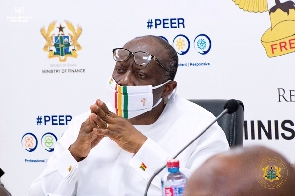 Finance Minister designate, Ken Ofori-Atta
Finance Minister designate, Ken Ofori-Atta
The Economics Research wing of Goldman Sachs, a global financial institution, says countries within the sub-Saharan Africa (SSA) region would find it difficult to escape the economic and fiscal fallout of the pandemic.
An analysis published by the firm said while the region may have succeeded in reining in the public health impact of the pandemic, economic gains made in the past two decades are at risk of being eroded.
“Our analysis points to a lagged recovery in sub-Saharan Africa, as domestic growth drivers stay subdued and FDI dries up. This in turn would slow fiscal consolidation and compound already concerning debt levels.
Without a deeper prioritisation of vaccine rollout and renewed financial support from the international community, the economic gains of the past two decades could be erased by COVID-19,” the global financial institution said.
Early in the outbreak of the pandemic, African countries were tipped to bear the brunt of the effects owing to poor health infrastructure as well as weak economies to shoulder unplanned expenditure to contain the disease.
Despite faring relatively better in terms of confirmed cases as well as fatalities compared with developed countries, the emergence of a new strain of the virus has coincided with a sharp rising case count and casualties.
“SSA finds itself in a rising second wave and a darkening outlook. Our findings imply that the spread of COVID-19 in SSA is higher than measured and likely to continue. The tools available to fight the disease are limited, with strict lockdowns too costly and the vaccination schedule light and slow,” the analysts said.
“The implications of the second wave of the pandemic would set back the continent’s path to recovery given that domestic lockdowns would restrict the services industry, a key source of growth in recent years, and tourism in particular would continue to suffer.
A lagged recovery does not bode well for the main economic challenge currently facing the continent, that of a burgeoning fiscal crisis. We recently found that countries in SSA will follow the trend in the Central and Eastern Europe Middle East and Africa region by imposing a significant negative fiscal impulse in 2021.
However, in many countries this consolidation will not be sufficient to arrest a rise in public indebtedness, while risks are skewed to the need for further spending or weaker revenue growth,” they added.
The Goldman Sachs analysts also echoed the Bank of Ghana’s fears that the prospects of government achieving a faster fiscal deficit reduction has been made more difficult following the recent surge in Covid-19 cases, which requires further unbudgeted expenses.
According to the BoG, Ghana’s fiscal deficit stood at 10.8 percent of GDP as of November 2020—a figure which could rise to about 15 percent if the cost of energy and financial sector reforms is included.
“The prospects of a sharp fiscal correction in 2021 now look unlikely amidst the second wave of the pandemic, which will be requiring additional spending to provide testing, vaccines, etc,” the central bank said when it met last month to assess the health of the economy.
Ken Ofori-Atta, the Finance Minister-designate, told Parliament last November that government intends to mobilise more revenue and rationalise expenditure in an effort to reduce the deficit to 8.3 percent of GDP in 2021, instead of the 9.6 percent target he had set in the 2020 mid-year budget.
Mr. Ofori-Atta believed that achieving the 8.3 percent of GDP fiscal deficit target in 2021 would help government meet the 5 percent of GDP fiscal deficit rule—set by the Fiscal Responsibility Act—by 2024.
- Commonwealth countries must create 5,000 jobs everyday till 2030 - Foreign Affairs Minister
- Use COVID-19 fund to strengthen health care, immunization financing — HFFG
- Parliament records a new case of coronavirus
- Breach of coronavirus safety protocols: GMA calls for action
- Chadians line up for Sinopharm as coronavirus vaccination campaign begins
- Read all related articles












